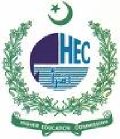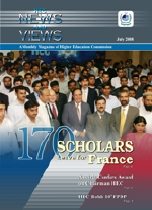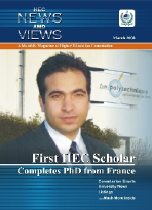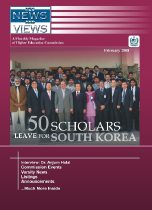Dr. Athar Osama
 Over the last several years of the current government, the Higher Education Commission (HEC) has funded thousands of scholarships and fellowships for Pakistanis to do PhD and Post-Doctoral work both at home and abroad. One of the most important of these programs has been the Foreign PhD Fellowships Scheme that funds as many as 1000 PhD fellowships per year for Pakistani students to go to countries around the world – mostly in Eastern Europe and South East Asia – to do their doctoral studies and return back after a specified duration of time to serve in Pakistani institutions.
Over the last several years of the current government, the Higher Education Commission (HEC) has funded thousands of scholarships and fellowships for Pakistanis to do PhD and Post-Doctoral work both at home and abroad. One of the most important of these programs has been the Foreign PhD Fellowships Scheme that funds as many as 1000 PhD fellowships per year for Pakistani students to go to countries around the world – mostly in Eastern Europe and South East Asia – to do their doctoral studies and return back after a specified duration of time to serve in Pakistani institutions.
Now that the first cohorts of these HEC scholars are completing their studies, the question arises: Will they return to Pakistan? And if they do, will they stay?
The terms of the program, I am told, are designed in a manner so as to dissuade these students from staying abroad after finishing their studies. This is done through a number mechanisms, including, provisions that discourage foreign employers and universities from hiring these students, and sending them to countries that are deemed not-so-hospitable to immigrant workers because of language barriers or immigration restrictions. Other initiatives to attract and absorb this talent back home include the ambitious plan of making several “world class” universities with international collaboration in Pakistan. Much has been said, and will continue to be said, about the latter and its fate continues to be in question.
While one would hope that these mechanisms put in place by HEC have been carefully thought out not only from the perspective of the country but also from that of the scholars, the other side of this coin, namely, the reception and environment these students receive when they actually return back to Pakistan has received much less attention but is equally, if not more, important for it is not enough to make these people return to Pakistan but rather policies must be in place to properly utilize and retain them.
At Pakistan Research Support Network (or Research-Network) we carried out a brief survey of the perception of Pakistani researchers and research students about the country’s research and academic environment and their motivations to work abroad or in their home country. The survey was anonymous thus allowing respondents to freely express their views and thoughts on the subject.
The survey findings represent an ample amount of both good and not-so-good news for Pakistan and its research environment. It also highlights interesting tendencies and motivations among its respondents some which may have been anticipated, but never formally documented before. These may be divided into four categories.
First, with regards to the quality of research environment in Pakistan, scholars identified a number of deficiencies including lack of quality leadership at the university, institution, and department level (92% of respondents), shortage of quality manpower (73%), and lack of quality and professional managed institutions (69%). Clearly, while an overwhelming proportion of scholars thought that Pakistan’s research and academic environment was inadequate to utilize their talents, more than 85% actually believed that Pakistan’s research and academic environment was lacking but improving over time.
Second, we asked the scholars about the intentions and motivations for returning home and/or working abroad. We believe that these individuals are very motivated and are quite realistic in terms of their expectations of what the country will have to offer to them but perhaps a little unrealistic in their perception of whether they will be able to overcome the challenges likely to be put in their way. For example, while just over 15% thought that when they return to Pakistan they will have all the necessary ingredients to allow them to carry out their research, as many as 79% said that “while they will face several challenges, but they will overcome these”. About 32% expressed serious doubts about the research and academic environment in Pakistan and noted that their decision to return will depend on whether they are able to address those concerns.
Of those surveyed, as many as 26% said that they will return back to the country because they have a “bond” with HEC or their employer to fulfill, another 34% said that while they do not have a bond with HEC or their employer, they will return back to Pakistan, nonetheless, and around 8% said that while they have a bond with HEC or their employer they are “rethinking” if they need to get out of it.
These data provide some very interesting–and heartening–results as well as opportunities for HEC or other competent agencies to devise policies to help these individuals make an informed decision. There is a vast majority of people who are willing to take on the challenge of returning back to Pakistan with a PhD in the hope that they will overcome the challenges involved. This population–young, idealistic, enterprising but also dedicated and passionate about their work–is especially vulnerable and HEC will do itself and the nation some good service to take extra care in transitioning them back into mainstream research in Pakistan.
Third, we asked the scholars about factors that demotivates them and that ultimately hamper their research productivity as a result. Several factors stood out. Freedom to work and micro-management by higher-ups (88% of scholars), access to equipment, knowledge, and data bases (75%), enough time to do research (72%), financial security (56%), and professional incentives (55%) are important consideration. The least important of all those asked–but still quite important–was financial incentives (chosen by 47%) of the scholars.
Again, evident from these responses is level of commitment and the degree of professional maturity of these scholars as are potential lessons for HEC bosses to understand and fully absorb for these are not the kind of qualities often associated with the tribal culture of Pakistani institutions where loyalty and conformance rather than freedom of expression, curiosity, and willingness to challenge intellectual authority are synomous with career progression.
Finally, there is ample room for both good news and source of concern for HEC. First of all, as many as 85% of the respondents thought that while Pakistani research and academic environment provided some challenges, it is also improving thus providing a reason for HEC to celebrate. A fairly substantial proportion of individuals are planning to return to the country which is yet another reason for HEC to be happy about. How HEC plays its cards in the coming years is likely to decide what percentage of these “likely return-ers” does it manage to convert into actual “return-ers”.
One issue of potential concern, however, is the notion or perception that HEC pays more attention to quantity rather than quality (shared by 70% of the scholars) is something that needs to be looked into and corrected for it is an often cited criticism of HEC’s policies. On the whole as well, I believe there is need for HEC to better explain its policies and programs for returning these individuals back, put it out in black and white so that people can make their future plans based on an explicit set of transparent policies rather than statements and comments that frequently appear in media.
There is also a need for a more transparent and open policy-making process at HEC that would help alleviate some of the questions and concerns these individuals may have about their future in Pakistan. Finally, HEC must develop a program to systematically evaluate the effect of its policies as well as communication strategy through independent evaluators to be able to better understand its own target market–researchers and academics inside and outside Pakistan–but also fine tune its own policies and programs. I think that if HEC could take a leaf from the findings of this survey and devise policies to help bridge some of the gaps identified above, it will finding a receptive and willing audience of young, educated, ambitious, and patriotic Pakistani researchers and scientists willing to return back and serve their homeland.
Dr. Athar Osama holds a PhD in Science and Innovation Policy and is the Founder of Pakistan Research Support Network and Muslim-Science.com






















































Asalm-O-Alikum Everyone,
I read in the THE NEWS, this story about plight of HEC students in South Korea.
http://www.thenews.com.pk/print1.asp?id=139409
I chat with some of my friends who recently left to Korea on same scholaship. I was surprised to know about the truthfullness of the story. How HEC offcial unethically response to students and no action is taken against them. In one university stiudents have not rceived the stipend from last three months, other recived a week back.
I was also told that HEc is not allowing students Internship and PHD against bond agreemnet. All HEC offcials including Chairman knows well all details. My friends also confirmed me as printed in the NEWS story that Korean professors are not interested in having pakistani students in their labs, as they are not able to do PHD, and as well as the Korean did good thing to support Pakistani Students PHD, but HEC decline to give students permission for it. HEC is paying about 40Lakh for a PHD in Korea, and Korean universities was doing for free for exsisting pakistani students.
Doing so HEC is just making prople mind more corrupt and against Pakistan. This will cause braiun drain in presnt situation. I think HEC officals instaed of saving seats. HEC started good, but now its fate it similar to other Pakistani institute due to their own deeds.
There is a rumor around that current scholars abroad are not being paid their stipend. If that is the case, it is really alarming, as thousands of students are studying abroad on these scholarships. The government cannot endorse the ‘bond’ if it cannot pay the cost of study.
Some figures from Pocket World in Figures 2008 Edition:
Total Expenditure on R&D (% of GDP, 2004)
1. Israel 4.55
2. Sweden 3.95
3. Finland 3.48
4. Japan 3.20
5. Iceland 2.87
6. United States 2.66
7. South Korea 2.63
8. Denmark 2.61
9. Switzerland 2.57
10. Germany 2.49
11. Taiwan 2.42
12. Austria 2.26
13. Singapore 2.24
14. France 2.16
15. Canada 1.90
16. United Kingdom 1.88
17. Belgium 1.85
18. Luxembourg 1.78
19. Norway 1.75
20. Netherlands 1.72
21. Australia 1.69
22. Slovenia 1.47
23. Czech Republic 1.27
24. Croatia 1.25
25. China 1.23
26. New Zealand 1.22
27. Ireland 1.19
28. Russia 1.17
29. Italy 1.13
30. Spain 1.05
31. Brazil 0.93
32. Estonia 0.91
33. Hungary 0.88
34. India 0.84
35. Jordan 0.81
36. Portugal 0.74
37. South Africa 0.73
38. Hong Kong 0.69
39. Turkey 0.66
40. Chile 0.65
41. Malaysia 0.63
42. Greece 0.62
43. Poland 0.54
44. Slovakia 0.53
45. Bulgaria 0.50
46. Venezuela 0.46
47. Argentina 0.44
48. Mexico 0.39
49. Romania 0.39
50. Thailand 0.28
Assalam o alaikum
I am a muslim Indian and and an infrequent but passionate visitor to this blog for reasons unknown to myself. I have learned a lot of things about Pakistan through the articles posted here and more so from the comments made on them. Small details which I would never get from any newspaper or magazine how-so-ever much in-depth reporting it does.
My comments on this article may not have much credibility because of my being not a Pakistani, but nonetheless I can not stop myself. Almost all the comments hope HEC program does get the results in the end and a few have expressed their concerns over the possibility of the scholars sent abroad on taxpayers’ money deciding not to return or wrangling their way out of the bond. But no one has cast any doubt over the utility of this program except for one Mr. Ahmad R. Shahid. I am primarily addressing him.
Dear Shahid sahab, what I gather from your comments is that you are trying to stress the need of tackling with basic problems first before plunging in to high end research. Sir, the basic problems of ANY country (including USA, which seems to be the benchmark for everyone in Pakistan, and India also) can not be corrected overnight or even in years. Even if they do get overcome, they will not remain so forever. They are recurrent by nature and need a continual maintenance effort. We cannot ask our men of brains to sit idle till kingdom come.
A two pronged effort is needed. One with short term goals and the other with long term aspirations. The HEC program is the long term effort needed.
You say that China is still behind UK in the number of research papers published, and India is still quite behind. Agreed. So do you propose to wait till these two overtake UK to start doing research in Pakistan?
You also contend that as for the IITs in India you don
contrary to Mr. Ahmad R. Shahid’s comment, I strongly oppose the HEC bond dictating that you may sign out by paying the money back. This clause is plain cheating and ridiculous allowing people to have the opportunity to begin their study on an interest free loan from the TAX money of people of Pakistan. This allows students to have a fall back plan to rely on HEC if they do not secure another scholarship from abroad and if they do so, they turn their back towards Pakistan and go out of the HEC contract by manipulating the sign out clause. It does not make any sense to me. I myself have funded my studies abroad and I know as you enter the academic system abroad, the opportunities grow and you can have interest free loans, 100s of scholarships based on your performance etc etc. So HEC basically does all the hard work of injecting you into the system and then IF you get established, you dump HEC first and foremost. Does not sound fair to me. This also destroys the career of all those students who could have genuinely come back to Pakistan and work towards the prosperity of Pakistan.
Assuming that by sending students to the eastern EU countries where they will have problems finding jobs, subsequently return home is merely a poorly thought plan. Pakistani students can communicate well in English as compared to the natives of these countries. English language advantage in combination with an EU degree offers them a complete uplift and thereby opens a world of career opportunities in USA/UK/Germany/Canada/Scandanavia/AUS etc etc…
Lastly, If you get to know these scholars on a personal level, they are all waiting for the day; Govt. is Pakistan is changed, effectively HEC gets dissolved, therefore no strings attached. I guess serious thinking needs to be done on the HEC side because at the end of the day, its TAX payers money who work and contribute to the economy of Pakistan. Pakistan Paind-a-bad.